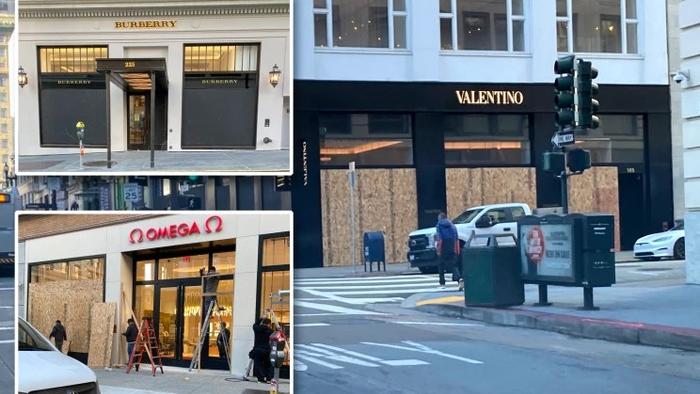Shellenberger: Why Looting Turned San Francisco Into A Ghost Town
Authored by Michael Shellenberger via Substack,
Usually at this time of year, San Francisco’s luxury stores are decked with holiday garlands. Instead, they’re boarded up after widespread “flash mob” looting turned Union Square — the city’s most fashionable shopping district — into an area resembling a blighted neighborhood in Detroit.
“It’s a ghost town,” said Michelle Tandler, a San Francisco native and high-tech entrepreneur, whose photos of the stores barricaded in plywood went viral on social media this week. “Every store has a security guard. People are going to lose their jobs. And these things have a ripple effect.”
Two weeks ago, San Francisco was the first of several progressive cities hit by smash-and-grab mobs of thieves, sometimes as many as 80 in a group. Video from the San Francisco looting of Louis Vuitton shows criminals walking casually out of the store, goods in hand. Other cities hit include Los Angeles, Chicago and Minneapolis.
“This is traumatizing for our associates and is unacceptable,” said Best Buy CEO Corie Barry four days before yet another outlet was ransacked on Black Friday in a Minnesota mall. “We are doing everything we can to try to create as safe as possible environment.”
These viral photos of boarded-up boutiques in San Francisco's upscale Union Square district this week are a bleak encapsulation of the city's approach to crime. Originally published in The New York Post.
There may be several factors behind the looting.
Part of the problem is a lack of police. San Francisco and other cities are short of cops, making robberies easier to get away with. San Francisco is short 400 officers, Los Angeles 300, with Minneapolis down by 200.
Total police officers in the United States declined by 20,000 between 2008 and 2018, due to a tighter labor market, rising technological complexity within the profession, and the high psychological toll of policing. Anti-police protests following the death of George Floyd in May 2020 have led to further attrition.
Progressive prosecutors are also letting more criminals free, sending the message that theft is an understandable response to poverty. In early 2020, San Francisco’s progressive District Attorney, Chesa Boudin, told the co-founder of Black Lives Matter before an audience at the Commonwealth Club that wealth inequality caused crime, and declared he would reduce prosecution of theft.
“We have some of the richest people in the history of the world in this city,” he said.
“Fortunes never imaginable 10 or 20 or 50 years ago. . . . When we have those extremes in close proximity, there’s going to be some level of property crime. That’s a reality.”
DA Boudin has charged just 46 percent of theft arrests, a 16 point decline since he took office in 2020, and charged just 35 percent of petty theft arrests, a 23 point decline from two years ago.
Meanwhile, more suspects are being let free before their court date, even though more than half of all offenders - and three-quarters of the most violent ones - released from San Francisco jails before their trial go on to commit new crimes.
Would-be criminals rationalize what they are about to do before they do it. They think to themselves that nobody is hurt by robbing Louis Vuitton or even a Zara store. If they are clever, they might even justify to themselves that it is a good thing, since their actions redistribute wealth. Criminals since the 1960s have defended their crimes as the acts of revolutionary anti-capitalists.
Such is the logic of socialism. The real crime, according to Karl Marx and others for the last 150 years, is private property and capitalism. “Property is theft” is one of the socialist movement’s most important slogans. Thus, the argument goes, any real-world crime — from robbing Louis Vuitton to assaulting a rich person — should be viewed as a revolutionary act. Anything that takes wealth from the rich and distributes it more equally, including pain, could be considered for the greater “good.”
While criminal justice progressives say they seek “alternatives” to incarceration, those alternatives require little from the people released, not even abstinence. Such was the case with Darrell Brooks, Jr., the suspect in the killing of six people and wounding at least 40 others in Waukesha, Wis., by running them over in his car. The man had been released on $1,000 bail after running over his girlfriend, just three weeks earlier.
Progressives have a more simplistic vision than they let on. To the public they promise a myriad of good ideas, including electronic monitoring, assertive case management and drug rehab. But pretrial diversion and other “alternatives” to prison have allowed criminals, sometimes even homicidal ones, to simply go free.
DA Boudin has made his true intentions clear.
“The challenge going forward,” he said at the Commonwealth Club in 2020, “is how do we close a jail?”
Being soft on criminals has its consequences.
For San Francisco, the result is a ghost town.
For decades, this Bay Area destination has held conferences where it held itself up to the world as a model of a “livable, walkable” city.
Not any more.
“People are scared to go downtown,” native resident Tandler told me.
“This is the destruction of a city.”
* * *
Michael Shellenberger is a Time Magazine "Hero of the Environment,"Green Book Award winner, and the founder and president of Environmental Progress. He is author of just launched book San Fransicko (Harper Collins) and the best-selling book, Apocalypse Never (Harper Collins June 30, 2020). Subscribe To Michael's substack here
Donate to Environmental Progress Tyler Durden Thu, 12/09/2021 - 23:00
http://dlvr.it/SF5CxC

No comments:
Post a Comment